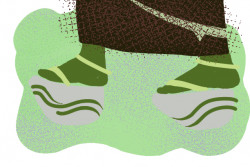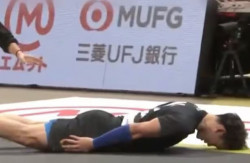
Originally published on metropolis.co.jp on July 2011
GOING GA-GA
- A class action lawsuit filed in the US claims that Lady Gaga failed to donate proceeds of her “relief wristband” to victims of the March 11 earthquake and tsunami.
- The suit also alleges that the singer “charged buyers an excessive $3.99 for shipping within the United States, against the actual cost of only 50 cents.”
- Japan and the US have agreed not to use the word “burden” in official documents when referring to US military bases in Okinawa. The term has been ditched in favor of the more neutral-sounding “impact.”
- Environment Minister Ryu Matsumoto praised UNESCO’s decision to name the Ogasawara Island chain as a World Heritage site, saying, “It brings us great joy.”
THE CRIME FILES
- When asked by police if he was involved in the robbery of a Tokyo security company that netted ¥600 million, a 31-year-old gangster replied, “Let me think about it.”
- The man later admitted his role in the theft but claimed that he spent his cut of the loot “at bars and [on] pachinko.”
- After smashing the glass door of a police station in Hakodate, Hokkaido, a 31-year-old high school soccer coach stripped off all his clothes and fled the scene on foot.
- A National Police Agency survey found that more than 30 percent of internet cafes around the country do not require customers to show ID. Pressure is building for the government to pass a law that would make ID checks mandatory at manga-kissa to prevent online fraud.
GOING DIGITAL
- A communications ministry survey revealed that, for the first time in 29 years, the number of landline phone subscriptions fell below 40 million.
- At the same time, the “penetration rate” of mobile phones in Japan has reached 96.8 percent.</li>
- It was reported that the communications ministry has set up 160 temporary call centers in 44 prefectures around the country to help people deal with the changeover from analog to digital terrestrial TV broadcasting, scheduled for July 24.
- Meanwhile, sales of flat-panel TVs are skyrocketing ahead of the changeover. Stores are reporting sales 250 percent higher than a year ago.
- Other hot items this summer include electric fans, whose sales have jumped 4.5-fold compared to last year.
AFTERSHOCKS

- Yamazaki Baking Co. announced that it would halve the number of products it offers in the aftermath of the March 11 quake. At its peak, the company made more than 1,800 bread items.
- Other products that will say sayonara due to the disruptions caused by the quake include Cherry brand cigarettes from Japan Tobacco and Kirin Brewery’s Enjuku brand happoshu.
- Sentence of the Week: “A 74-year-old woman died here after being hit by a car on the night of June 21 at an intersection where street lights were off as part of the city’s power-saving measures.” (via The Mainichi Daily News)
- A think tank affiliated with the economics ministry found that if all the incandescent and fluorescent light bulbs in Japan were replaced with LEDs, annual domestic power consumption would drop by 9 percent.
OFFICIAL BUSINESS
- A 45-year-old supervisor at the labor ministry was suspended from his job after it was discovered he had been moonlighting as a boxing referee since 1997.
- Tokyo Metro admitted that one of its subway drivers sent more than 400 text messages to a girlfriend while on the job. The railway assured the public that his “behavior did not affect train functions.”
- Finance Minister Yoshihiko Noda admitted that he had been “wined and dined” several times during the past year by the president of a data processing company who has since been arrested for tax evasion.
- UN Secretary General Ban Ki Moon said he hopes that Japan will dispatch its SDF troops to southern Sudan to help in peacekeeping operations.
BY THE NUMBERS
- A survey by recruitment consultancy Robert Walters found that just 27 percent of workers in Japan have received raises this year.
- Honda said that it will boost the number of scooters and motorcycles it produces in India each year to a whopping 10 million.
- Scientists from the University of Tokyo and Mikimoto jewelry company have identified nearly 30,000 genes involved in the formation of pearl oyster shells. It’s said that the discovery “could shed light on the mystery surrounding the beauty of pearls.”
- A Tokyo man who works for an NPO that helps arrange organ transplants for Japanese people abroad was accused of concealing about ¥10 million in fees paid by clients.
POWER PLAYS
- Business owners who rely on vending machines to draw customers have expressed alarm about plans by Suntory to have its machines “switch on and off on a set schedule” to save power this summer.
- Meanwhile, a spokesman for Keikyu railways says that the company’s last-minute attempts to cut energy consumption are “like trying to wring more water out of an already dry rag.”
- Softbank’s shareholders approved the company’s plan to enter the solar power generation business.
- Weightlifter Kazuomi Ota set a new Japanese record when he snatched 185kg at the national championships in Saitama last month.
HERE & THERE
- Hydrogen sulfide poisoning is suspected in the deaths of two workers who collapsed while cleaning a chemical tanker in Nagoya Port. A third man was hospitalized.
- Finding “no premeditation behind the crime,” prosecutors in Naha declined to indict the captain of a Chinese fishing trawler whose boat rammed two Japanese Coast Guard ships near the disputed Senkaku Islands in the East China Sea last September.
- The Ministry of Agriculture, Forestry and Fisheries has asked the Coast Guard to dispatch a boat to help protect Japanese whaling ships from anti-whaling activists during this season’s “research” expedition to the Antarctic Ocean.
- A government survey found that members of the Ainu ethnic minority group living outside Hokkaido earn less money and are more likely to be on welfare than other Japanese.







